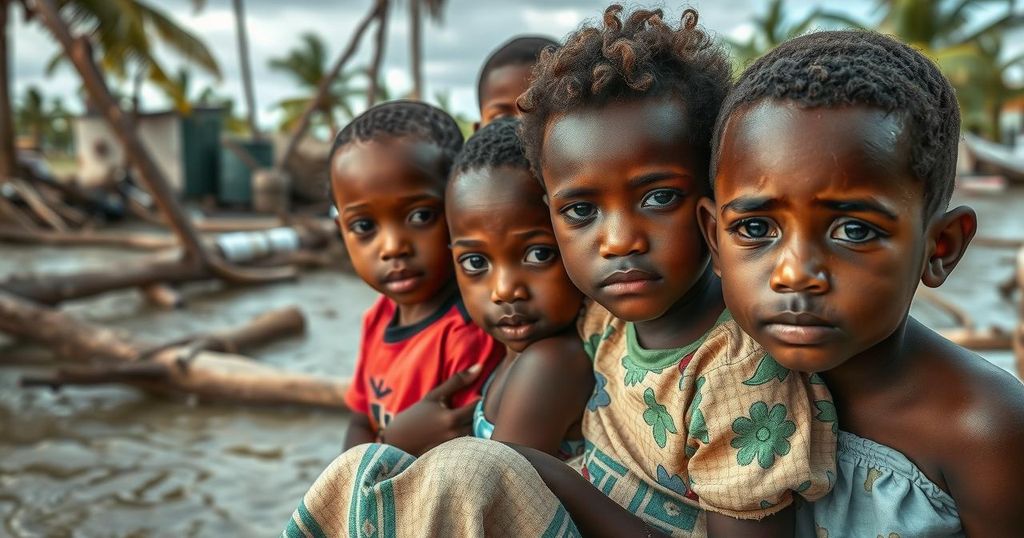Tropical Cyclone Chido struck northern Mozambique, affecting around 90,000 children and destroying over 35,000 homes. Significant damage occurred to schools and health facilities, worsening an already critical humanitarian situation exacerbated by conflict and disease in the region. Immediate relief efforts are underway, but challenges remain in delivering adequate assistance to affected populations.
Tropical Cyclone Chido has wreaked havoc across northern Mozambique, particularly in Cabo Delgado province, affecting approximately 90,000 children. Reports from the UN Children’s Fund (UNICEF) estimate that the cyclone destroyed or damaged over 35,000 homes, displacing thousands of families. The storm, which made landfall on Sunday, also devastated educational facilities and healthcare infrastructure, with at least 186,000 classrooms and 20 health facilities impacted.
Despite ongoing assessments indicating that around 174,000 people have been affected, the extent of destruction is not fully assessed yet, and numbers may rise. The cyclone’s impact compounded existing crises in Mozambique, where children were already facing dangers from conflict, drought, and disease outbreaks, as highlighted by UNICEF Representative Mary Louise Eagleton.
Cabo Delgado has been beleaguered by seven years of destructive conflict, leading to over 1.3 million individuals being internally displaced, with 80 percent comprised of women and children. Cyclone Chido has added to the struggles, obliterating what little survivors managed to rebuild. The cyclone also affected neighboring Nampula and Niassa provinces, exacerbating situations by damaging two water facilities and leaving over 25,000 families without electricity.
The health conditions in the region are precarious, with fears that the destruction could further escalate a cholera outbreak already present. WHO personnel are on-site to conduct health assessments and ensure immediate needs are met for the affected populace. Within the first 48 hours after the cyclone, emergency assistance was initiated by the UN Refugee Agency (UNHCR) in Pemba, distributing essential items to over 2,600 affected individuals.
UN Secretary-General António Guterres expressed that UN teams in the region are actively providing emergency assistance and are prepared to offer further support as required. While relief efforts are unfolding, the coordination office noted that inadequate supplies are hindering swift responses. Tom Fletcher, the Emergency Relief Coordinator, has allocated $4 million to bolster early humanitarian responses in Mozambique.
As Cyclone Chido further impacted regions, including Mayotte and southern Malawi, where significant destruction was reported, the UN agencies continue to monitor the situation to support the affected communities effectively.
Moving forward, the World Food Programme (WFP) anticipates that nearly 3.3 million people in Mozambique may face acute food insecurity next year. This projection accentuates the urgent need for support and strategic responses to assist those most affected by the cyclone’s devastation, as well as individuals previously trapped in persistent cycles of crisis.
The article discusses the aftermath of Tropical Cyclone Chido, which struck northern Mozambique, significantly impacting communities and particularly affecting children. It outlines the destruction inflicted on homes, schools, and health facilities and highlights the poverty and vulnerabilities many families in the region already faced due to ongoing crises such as conflict and disease. Given Mozambique’s critical humanitarian situation, the article further explores the efforts by UNICEF, UN agencies, and other organizations to respond to the emergency and provide necessary support to the impacted populations.
In conclusion, Tropical Cyclone Chido has severely impacted northern Mozambique, leaving approximately 90,000 children vulnerable amid widespread destruction. The cyclone exacerbated existing humanitarian crises, highlighting the urgent need for coordinated emergency responses. As local and international organizations act swiftly to provide relief, awareness and assistance remain crucial to addressing the ongoing challenges faced by those affected in the region. UNICEF and other partners continue to advocate for humanitarian support to secure the well-being and safety of the children and families in distress.
Original Source: news.un.org






